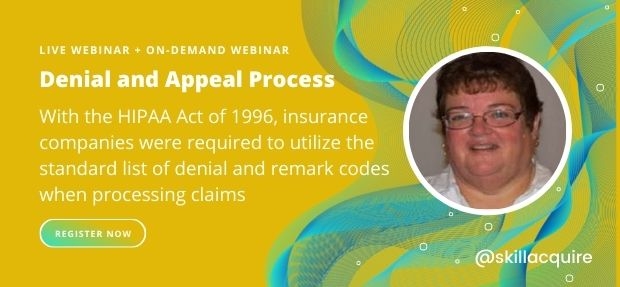YOUR CART
- No products in the cart.
Subtotal:
$0.00
BEST SELLING PRODUCTS

Conference Material (Password Required)
With the HIPAA Act of 1996, insurance companies were required to utilize the standard list of denial and remark codes when processing claims. It is up to the office to verify that denials received are appropriate and interpret remark codes to further understand the denial. This webinar will assist those just entering medical billing or those that have experience and knowledge and want to get some new ideas. Insurance companies rely a lot on computers for processing claims, so there are times when claims are denied in error. It is important to not only recognize the errors but to know what to do when these errors occur. The appeals process is a means to dispute denials and to share with the insurance company additional information not originally submitted with the claim for reconsideration. It is critical that the appeal give any and all information to the insurance carrier as to why it felt the denial is in error and to justify that with documentation. This documentation can include medical records, coding references, and coding policies. Insurance carriers are creating more policies and guidelines for procedures and services. Denials are received for incomplete claims or claims that are not submitted according to that insurance companies policies. But what can be done if the insurance company still denies the appeal? We will look at the additional options for claims when the appeal process has been exhausted and there still has not been any reimbursement.
 Lynn M. Anderanin, CPC, CPB, CPMA, CPC-I, CPPM, COSC is the Sr. Coding Educator for Healthcare Information Services, a revenue cycle management and consulting service in the Chicagoland area. Prior to relocating to Chicago, Lynn was the Billing Office Manager and surgical coder for Hand Surgery Associates, now Michigan Surgery Specialists in the Detroit Area. She has over 39 years of experience in all areas of the physician practice including Practice Administrator, Billing Manager, and Director of Operations. Her experience is primarily in the specialties of Orthopaedics, Rheumatology, and Hematology/Oncology. She has been a speaker for many conferences, including the AAPC National Conferences and Workshops, Community Colleges, Audio Conferences, Certification classes, and Webinars. Lynn became a CPC in 1993, a Certified Instructor in 2002, a Certified Orthopedic Surgery Coder in 2009, an examination in which she participated in creating. She passed the Certified Practice Manager exam in 2015, the Certified Medical Auditor exam in 2016, and the Certified Professional Biller exam in 2021. Lynn is the founder of the first local chapter of the AAPC in Chicago, which is now 25 years old, and a former member of the AAPC National Advisory Board as well as several other committees for the AAPC.
Lynn M. Anderanin, CPC, CPB, CPMA, CPC-I, CPPM, COSC is the Sr. Coding Educator for Healthcare Information Services, a revenue cycle management and consulting service in the Chicagoland area. Prior to relocating to Chicago, Lynn was the Billing Office Manager and surgical coder for Hand Surgery Associates, now Michigan Surgery Specialists in the Detroit Area. She has over 39 years of experience in all areas of the physician practice including Practice Administrator, Billing Manager, and Director of Operations. Her experience is primarily in the specialties of Orthopaedics, Rheumatology, and Hematology/Oncology. She has been a speaker for many conferences, including the AAPC National Conferences and Workshops, Community Colleges, Audio Conferences, Certification classes, and Webinars. Lynn became a CPC in 1993, a Certified Instructor in 2002, a Certified Orthopedic Surgery Coder in 2009, an examination in which she participated in creating. She passed the Certified Practice Manager exam in 2015, the Certified Medical Auditor exam in 2016, and the Certified Professional Biller exam in 2021. Lynn is the founder of the first local chapter of the AAPC in Chicago, which is now 25 years old, and a former member of the AAPC National Advisory Board as well as several other committees for the AAPC.